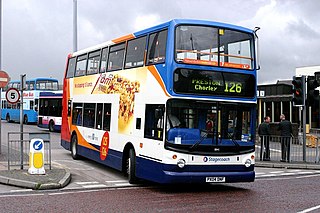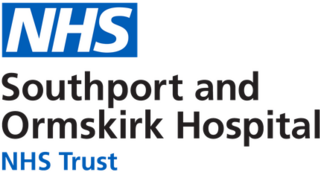
Lancashire is a ceremonial county in North West England. It is bordered by Cumbria to the north, North Yorkshire and West Yorkshire to the east, Greater Manchester and Merseyside to the south, and the Irish Sea to the west.

Stagecoach North West was a major bus operator in North West England. The company was a subsidiary of the Stagecoach Group, and had its origins in the purchase of Cumberland in 1987 and Ribble Motor Services in 1988 from the National Bus Company. The head office of Stagecoach North West was in Carlisle. Although the cities of Liverpool and Manchester are in the North West of England, Stagecoach Manchester and Stagecoach Merseyside were run as separate divisions.

Lancashire Teaching Hospitals NHS Foundation Trust is one of the United Kingdom's NHS Foundation Trusts. It provides healthcare for people in the Preston area and surrounding area in northwest England. The trust runs Royal Preston Hospital on the northern outskirts of the city in the Fulwood area and Chorley and South Ribble Hospital.

Blackpool Victoria Hospital, known locally as The Vic, is the main hospital for Blackpool and the Fylde Coast in Lancashire, England. It is managed by the Blackpool Teaching Hospitals NHS Foundation Trust.
NHS North West was a strategic health authority (SHA) of the National Health Service in England. It operated in the North West region, which is coterminous with the local government office region.

HCRG Care Group is a private provider of community health and social services in parts of the UK, commissioned by the National Health Service and by local authorities in England.
Blackpool Teaching Hospitals NHS Foundation Trust is an NHS Foundation Trust providing health services in North Lancashire, England. It runs Blackpool Victoria Hospital which is a large busy acute hospital; two smaller community hospitals - Clifton Hospital and Fleetwood Hospital; the National Artificial Eye Service; Blenheim House Child Development Centre and community health services for North Lancashire.

Lancashire & South Cumbria NHS Foundation Trust, known as Lancashire Care NHS Foundation Trust until October 2019, provides a range of services including secondary mental health care, inpatient child and adolescent mental health services, perinatal mental health and forensic services including low and medium secure care. It also provides a range of physical health and well-being services in the community with partners in the Lancashire and Sefton area. The Trust was first established in 2002 and employs approximately 7,000 staff who provide care from more than 400 sites.

Southport and Ormskirk Hospital NHS Trust was the principal healthcare provider to 258,000 people across Southport, Formby and West Lancashire.
Healthcare in Devon was the responsibility of two clinical commissioning groups until July 2022, one covering Northern, Eastern and Western Devon, and one covering South Devon and Torbay. It was announced in November 2018 that the two were to merge.
Healthcare in Cumbria was the responsibility of Cumbria Clinical Commissioning Group until July 2022. On 1 April 2017 32 GP practices left the CCG and merged with Lancashire North CCG to form Morecambe Bay CCG.

Healthcare in Kent has, from 1 July 2022, been mainly the responsibility of the Kent & Medway Integrated Care Board. Certain specialised services are directly commissioned by NHS England, coordinated through the South East integrated regional team. Some NHS England structures are aligned on a Kent and Medway basis, others on a South East basis and there is liaison with London to provide many tertiary healthcare services.
Healthcare in Somerset, England was the responsibility of three clinical commissioning groups (CCGs) until July 2022. These covered the ceremonial county of Somerset, which comprises the areas governed by the three unitary authorities of Somerset, North Somerset and Bath and North East Somerset.
Healthcare in Sussex is the responsibility of NHS Sussex, an integrated care system and the NHS Sussex Partnership NHS Foundation Trust.
Healthcare in Cambridgeshire was the responsibility of NHS Cambridgeshire and Peterborough Clinical Commissioning Group until July 2022. This was one of the largest in the United Kingdom.
Healthcare in Essex is now the responsibility of six clinical commissioning groups: Basildon and Brentwood, Mid Essex, North East Essex, Southend, Thurrock and West Essex.
Healthcare in Northumberland was the responsibility of the Northumberland, Newcastle Gateshead, and North Tyneside clinical commissioning groups from 2013 to 2022 before being replaced by integrated care systems.







